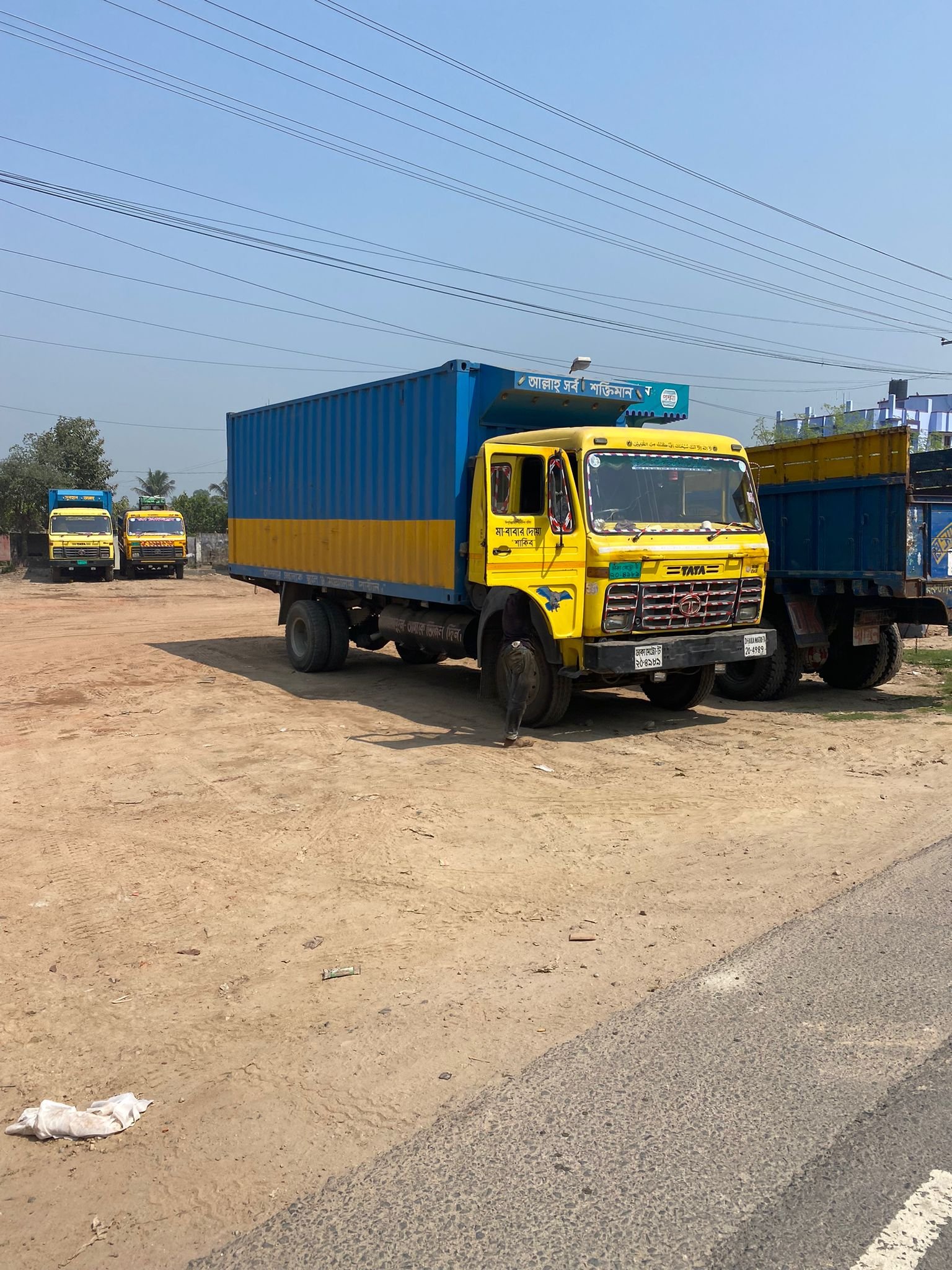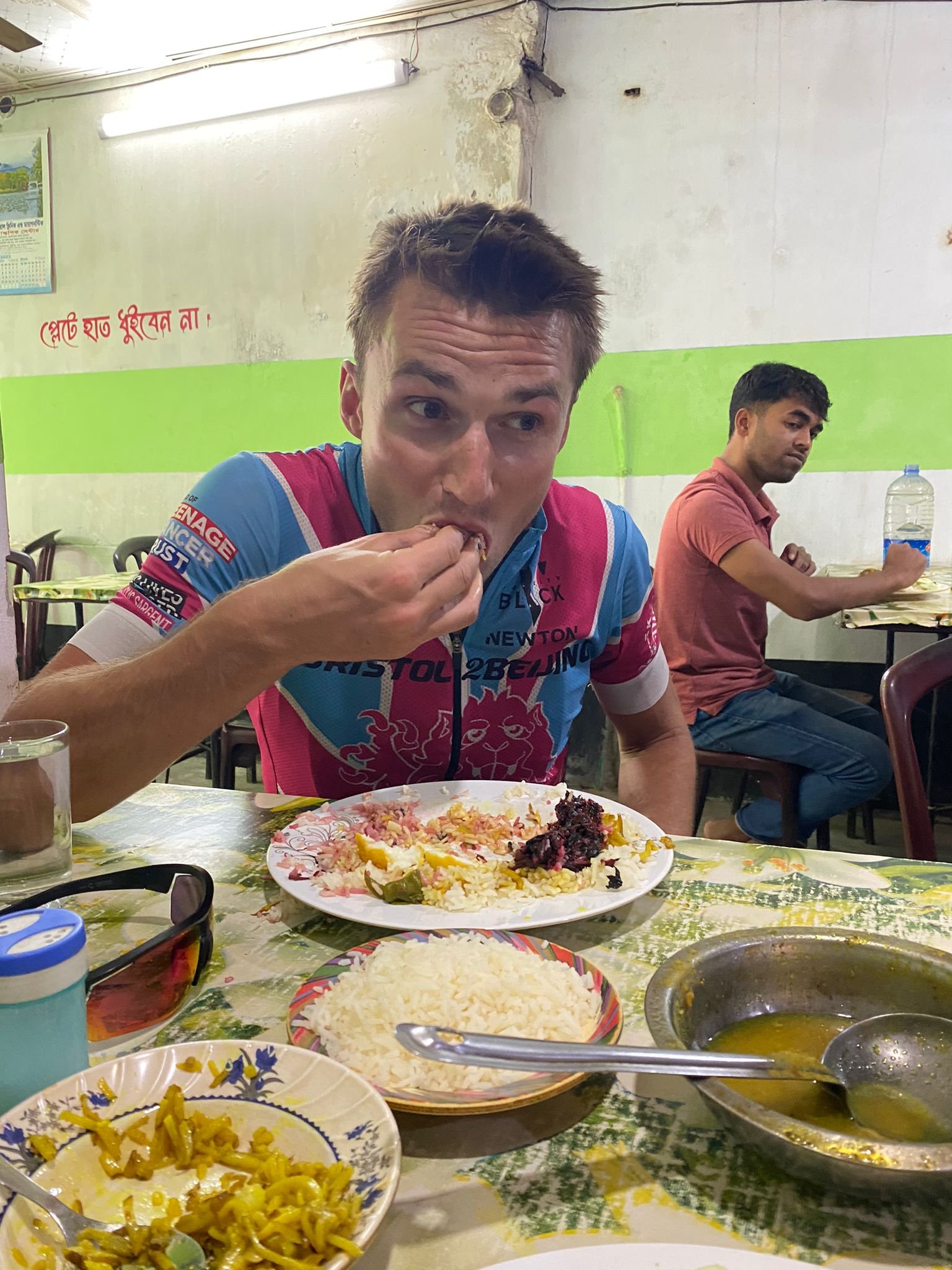Across the Border
“I left my house without telling my parents.”
Tanvir was full of surprises. He had travelled overnight to reach me (including a 4 hour stretch covering only 2 kilometres), his favourite author was Henry Rider Haggard, a Victorian fantasy novellist (who I had to discreetly google), and he hadn’t ever had pizza (he wanted his first pizza to be in Italy).
“I told my sister, ‘when my parents ask, just show them his blog.’”
Although Tanvir was 26 years old, family norms are different on the subcontinent and Tanvir explained it would created a lot of fuss to tell them he would be cycling with me beforehand: “there would be too many questions, they would want to know every detail.”
Tanvir and I met at 11am in the border town of Benapole. Tanvir had a scraggly beard, hiking trousers and long-sleeved top to protect him from the sun. He had a soft, slightly goofy air to him which I immediately warmed to. Tanvir apologised profusely for his delayed arrival, yet I assured him it was no problem: it had given me time for a run, writing a blog post, and an extra 4 cups of tea.
We set off for Dhaka along a road lined with majestic trees, sturdy tendrils reaching for the sky. “They were going to widen this road, but they didn’t want to cut down the trees” Tanvir explained. We were cycling on Jashore road, which Tanvir explained held particular significance for Bangladeshis. “In 1971, in our war of independence with Pakistan, 10 million refugees walked down this road to get to India.” That was difficult to imagine now: the road was slick tarmac, the morning sun was a friendly beam, rice paddies glowed to either side and there was hustle and bustle as we cycled through villages.
Tanvir and I cycling the roads to Dhaka.
Bangladesh was also full of surprises. It was a country I knew almost nothing about, and had been vaguely cautious towards it; one expat friend had said it was like India, but even more intense. Yet I had been surprised on my first night in Benapole when a man introduced himself as a journalist, shook my hand, and walked on – no questions, no photos. Later that evening, I happened upon a local café, where the men were playing carrom, a cross between pool and table-hockey. They greeted me, explained their game, and then carried on, leaving me as a grateful spectator. I enjoyed being a wallflower.
However, as Tanvir and I cycled, it was clear that a pink tandem has a certain magnetism. The first time we stopped for tea (in Bangladesh it’s served black, like in Turkey and Azerbaijan), we pulled up by a wooden tea shack in a small village. There were a couple of people around. Yet before the tea arrived, a crowd of twenty men had appeared, all looking curiously at Chris the tandem, tapping the frame, trying out the brakes, inspecting the saddle bags. What leapt out at me was the number of teeth I saw. Everyone was grinning and smiling.
We set off again on the narrow country roads. Tanvir had chosen a route off the main highway, and this was a revelation. The roads were smooth, fairly quiet and immersed us in the gorgeous Bangladeshi countryside. Trees lined the road, shading us from the strong sun, but between their trunks we could see endless lush verdant rice paddies. There were canals and fish ponds punctuated the green, creating a beautiful wetland area. It reminded me a little of the Norfolk Broads – but much greener and more agricultural. “Those ponds tease me,” Tanvir called out. “I love swimming and they are so tempting.” I agreed, and told Tanvir how beautiful this all was.
“Luke, I wish you were here in the monsoon. Then it is so much greener, it burns your eyes.”
The fish ponds strewn across rural Bangladesh.
Personally, I was glad not be cycling through the monsoon season, but it would have been a lot harder 10 years ago. Over the last decade an intense road-improvement programme has been rolled out: hard dirt roads replaced with tarmac. Tanvir explained that during the monsoon many of the roads we were cycling would become flooded and previously had been an impassable mud bath. Across Bangladesh, infrastructure was being upgraded, and 150 kilometre journeys that once took 24 hours now take a mere four. A huge bridge was being built across the might Ganges river, which separates Dhaka from the west of the country. It would be finished in a few months, and was being built by a Russian company, fresh with expertise from building the 19 kilometre bridge connecting Crimea with the Russian mainland.
The trucks in Bangladesh happen to be painted in blue and yellow, seemingly in solidarity with Ukraine. I jokingly mentioned this to Tanvir and he shook his head sadly. “I don’t know what to say anyone more. I’m tired of it. Just words, words, words.” I hadn’t anticipated that Bangladeshis would be following events happening thousands of miles away, but it was a “hot topic,” according to Tanvir. “Whenever you say you’re from the UK, people hear ‘Ukraine’ because that’s always in the news right now,” he explained.
Tanvir had recently started working for a software company, and his team leader was in Kiev. “We’re all so worried,” Tanvir told me. The ripples of the war are travelling far.
A Ukrainian-themed truck.
We stopped for lunch in a roadside café – a basic place with plastic chair and tables and a selection of pre-cooked food in enormous metal basins the size of my bike rims. They were all yellow/brown/orange, with chunks of fish, meat or chicken swimming in them. Enough rice to feed an army was in a metal pot the size of a lorry wheel. Tanvir ordered and we started scooping the rice and curry up with our fingers and popping it into our mouths.
“Bengalis are made of fish and rice,” Tanvir said to me, laughing, and as I looked around this seemed entirely accurate. Eating with your hands gives you a different relationship with your food – it heightens the sensory experience and connection with your food. On another table, a man in plastic blue flip flops and a checked blue lungi rested his hand on his mound of rice. I stared, and the hand stayed there. Much as in the UK we might hold a mug of tea or pint of beer, this man was as comfortable with his hand on the rice. After a minute, he began scrunching it up and mixing in the fish and daal before sending it into his mouth.
Tanvir, however, was not impressed by the rice. He had barely eaten anything and was looking disappointed. I asked him what was wrong. “It doesn’t feel right, it’s too big.” He looked at my blank face with a touch of exasperation. The rice had seemed fine to me. “You don’t notice it? You can’t taste the difference from last night’s?”
I shook my head.
“These grains, they suck up all the curry. It’s wrong. This is bad rice.”
I finished my plate, but Tanvir was unable to stomach these unhappily large and porous grains of rice.
Tastier than it looks.
We carried on our way towards Dhaka. The villages were mainly populated by men and, to my surprise, most of the (few) women we saw wore burqas, only their eyes showing, which were focussed on the floor. On my travels, only in Saudi Arabia and the Gulf had I seen this many women in burqas. Neda, a zesty and dynamic woman from Dhaka who joined Tanvir and I for our final day of cycling to Dhaka, railed against this conservatism: “These women are conditioned from the moment they are born to look after the men, do as they’re told and have babies. They have no choice in their lives.”
I was passing through lives – a world – so different from my own, and it reminded me of how transient a cycle expedition is. Even over two years, you only get the briefest of snapshots into the lives of other people. I wondered what lives these women led.
Cycling through the streets of unknown lives.
As we neared Dhaka, Tanvir told me more about why he wanted to join me. “Six years ago, I was not in a good place. I didn’t know what I wanted to do, I played a lot of computer games. I was lost. Do you know what changed my life?”
We pedalled for a few moments in silence.
“Cycling. It has given me so much energy and helped me find my direction.”
I immediately thought back to Divyansh, my final riding partner in India, who had told me something very similar: it was cycling that had allowed him to get his life back on track.
“I was so happy to hear about you and when I saw there was an opportunity to join you, I dropped everything. I want to cycle around the world like you.”
Slightly embarrassed, I steered the conversation.
“So where do you hope to ride in the future?”
“I want to ride in Patagonia, on a bike that I’m going to build myself this year. Do you know what the name will be?”
“Tell me.”
“Esperanza”.
Freedom.





